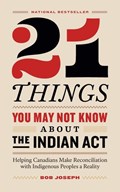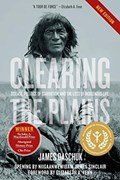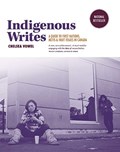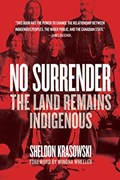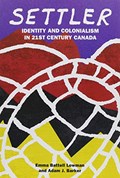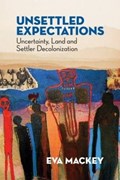Narrow Results By
21 Things You May Not Know About the Indian Act : Helping Canadians Make Reconciliation with Indigenous Peoples a Reality
https://archives.whyte.org/en/permalink/catalogue25007
- Medium
- Library - Book (including soft-cover and pamphlets)
- Published Date
- 2018
- Author
- Joseph, Bob
- Publisher
- Port Coquitlam : Indigeneous Relations Press
- Call Number
- 08.1 J77t
1 website
- Author
- Joseph, Bob
- Publisher
- Port Coquitlam : Indigeneous Relations Press
- Published Date
- 2018
- Physical Description
- 189 pages
- Subjects
- Canada
- First Nations
- Politics
- Abstract
- Since its creation in 1876, the Indian Act has dictated and constrained the lives and opportunities of Indigenous Peoples, and is at the root of many enduring stereotypes. Bob Joseph's book comes at a key time in the reconciliation process, when awareness from both Indigenous and non-Indigenous communities is at a crescendo. Joseph examines how Indigenous Peoples can return to self-government, self-determination, and self-reliance--and why doing so would result in a better country for every Canadian. He dissects the complex issues around the Indian Act, and demonstrates why learning about its cruel and irrevocable legacy is vital for the country to move toward true reconciliation
- Contents
- Acknowledgements
- Introduction
- The Indian Act
- Part 1 - Dark Chapter
- The Beginning
- Resistance is Futile
- Tightening Control
- "They rose against us"
- And Its Days Are Numbered
- Part 2 - Dismantling the Indian Act
- If Not the Indian Act, Then What?
- Looking Forward to a Better Canada
- Appendix 1 - Terminology
- Appendix 2 - Indian Residential Schools: A Chronology
- Appendix 3 - Truth and Reconciliation Commision of Canada: Calls to Action
- Appendix 4 - Classroom Activities, Discussion Guide, and Additional Reading
- Appendix 5 - Quotes from John A. Macdonald and Duncan Campbell Scott
- Notes
- Index
- ISBN
- 9780995266520
- Accession Number
- P2020-1
- Call Number
- 08.1 J77t
- Collection
- Archives Library
- URL Notes
- Associated blog post and link to order book
Websites
This material is presented as originally created; it may contain outdated cultural descriptions and
potentially offensive content.
Read more.
Clearing the Plains : disease, politics of starvation, and the loss of Indigenous life
https://archives.whyte.org/en/permalink/catalogue25209
- Medium
- Library - Book (including soft-cover and pamphlets)
- Published Date
- 2019
- Author
- Daschuk, James W.
- Publisher
- Regina, Saskatchewan, Canada : University of Regina Press
- Edition
- New edition
- Call Number
- 08.1 D26c
1 website
- Author
- Daschuk, James W.
- Responsibility
- James W. Daschuk
- Edition
- New edition
- Publisher
- Regina, Saskatchewan, Canada : University of Regina Press
- Published Date
- 2019
- Physical Description
- xxxvi, 362 pages : illustrations, maps
- Subjects
- Health
- First Nations
- Canada
- Government
- Abstract
- Revealing how Canada's first Prime Minister used a policy of starvation against Indigenous people to clear the way for settlement, the multiple award-winning Clearing the Plains sparked widespread debate about genocide in Canada. In arresting, but harrowing, prose, James Daschuk examines the roles that Old World diseases, climate, and, most disturbingly, Canadian politics—the politics of ethnocide—played in the deaths and subjugation of thousands of Indigenous people in the realization of Sir John A. Macdonald’s "National Dream. " It was a dream that came at great expense: the present disparity in health and economic well-being between Indigenous and non-Indigenous populations, and the lingering racism and misunderstanding that permeates the national consciousness to this day. This new edition of Clearing the Plains has a foreword by Pulitzer Prize winning author, Elizabeth Fenn, an opening by Niigaanwewidam James Sinclair, and explanations of the book’s influence by leading Canadian historians. Called “one of the most important books of the twenty-first century” by the Literary Review of Canada, it was named a “Book of the Year” by The Globe and Mail, Quill & Quire, the Writers’ Trust, and won the Sir John A. Macdonald Prize, among many others. (From University of Regina Press website)
- Contents
- Bozhoo Indinawemaganidog : An Invitation to All Our Relations by Niigaan James Sinclair
- Foreward by Elizabeth A. Fenn
- Introduction to the 2019 Edition
- Introduction to the 2013 Edition
- Chapter 1 - Indigenous Health, Environment and Disease Before Europeans
- Chapter 2 - The Early Fur Trade: Territorial Dislocation and Disease
- Chapter 3 - Early Competition and the Extension of Trade and Disease, 1740-82
- Chapter 4 - Despair and Death during the Fur Trade Wars, 1783-1821
- Chapter 5 - Expansion of Settlement and Erosion of Health during the HBC Monopoly, 1821-69
- Chapter 6 - Canada, the Northwest and the Treaty Period, 1869-76
- Chapter 7 - Treaties, Famine and the Epidemic Transition on the Plains, 1877-82
- Chapter 8 - Dominion Administration of Relief, 1883-85
- Chapter 9 - The Nadir of Indigenous Health, 1886-91
- Conclusion
- ISBN
- 9780889776227
- Accession Number
- P2020.07
- Call Number
- 08.1 D26c
- Collection
- Archives Library
- URL Notes
- University of Regina Press website
Websites
This material is presented as originally created; it may contain outdated cultural descriptions and
potentially offensive content.
Read more.
Indigenous writes : a guide to First Nations, Metis & Inuit issues in Canada
https://archives.whyte.org/en/permalink/catalogue25010
- Medium
- Library - Book (including soft-cover and pamphlets)
- Published Date
- 2016
- Author
- Vowel, Chelsea
- Publisher
- Winnipeg, MB, Canada : HighWater Press
- Call Number
- 07.2 V85i
1 website
- Author
- Vowel, Chelsea
- Publisher
- Winnipeg, MB, Canada : HighWater Press
- Published Date
- 2016
- Physical Description
- xii, 290 pages : illustrations, map
- Subjects
- First Nations
- Canada
- Writing
- Abstract
- In Indigenous Writes, Chelsea Vowel initiates myriad conversations about the relationship between Indigenous peoples and Canada. An advocate for Indigenous worldviews, the author discusses the fundamental issues--the terminology of relationships; culture and identity; myth-busting; state violence; and land, learning, law and treaties--along with wider social beliefs about these issues. She answers the questions that many people have on these topics to spark further conversations at home, in the classroom, and in the larger community. (from publisher)
- Contents
- Introduction : how to read this book -- Part 1. The terminology of relationships -- 1. Just don't call us late for supper : names for Indigenous peoples -- 2. Settling on a name : names for non-Indigenous Canadians -- Part 2. Culture and identity -- 3. Got status? : Indian status in Canada -- 4. You're Me´tis? Which of your parents is an Indian? : Me´tis identity -- 5. Feel the Inukness : Inuit identity -- 6. Hunter-gatherers or trapper-harvesters? : why some terms matter -- 7. Allowably Indigenous : to ptarmigan or not to ptarmigan : when indigeneity is transgressive -- 8. Caught in the crossfire of blood-quantum reasoning : popular notions of Indigenous purity -- 9. What is cultural appropriation? : respecting cultural boundaries -- 10. Check the tag on that "Indian" story : how to find authentic Indigenous stories -- 11. Icewine, roquefort cheese, and the Navajo Nation : Indigenous use of intellectual property laws -- 12. All my queer relations : language, culture, and two-spirit identity -- Part 3. Myth-busting -- 13. The myth of progress -- 14. The myth of the level playing field -- 15. The myth of taxation -- 16. The myth of free housing -- 17. The myth of the drunken Indian -- 18. The myth of the wandering nomad -- 19. The myth of authenticity -- Part 4. State violence -- 20. Monster : the residential-school legacy -- 21. Our stolen generations : the sixties and millenial scoops -- 22. Human flagpoles : Inuit relocation -- 23. From hunters to farmers : Indigenous farming on the prairies -- 24. Dirty water, dirty secrets : drinking water in First Nations communities -- 25. No justice, no peace : the Royal Commission on Aboriginal Peoples -- Part. 5. Land, learning, law, and treaties -- 26. Rights? What rights? : doctrines of colonialism -- 27. Treaty talk : the evolution of treaty-making in Canada -- 28. The more things change, the more they stay the same : numbered treaties and modern treaty-making -- 29. Why don't First Nations just leave the reserve? : reserves are not the problem -- 30. White paper, what paper? : more attempts to assimilate Indigenous peoples -- 31. Our children, our schools : fighting for control over Indigenous education.
- ISBN
- 9781553796800
- Accession Number
- P2020-1
- Call Number
- 07.2 V85i
- Collection
- Archives Library
- URL Notes
- Summary on Highwater Press / Portage & Main Press website
Websites
This material is presented as originally created; it may contain outdated cultural descriptions and
potentially offensive content.
Read more.
No surrender : the land remains Indigenous
https://archives.whyte.org/en/permalink/catalogue25009
- Medium
- Library - Book (including soft-cover and pamphlets)
- Published Date
- 2019
- Author
- Krasowski, Sheldon
- Publisher
- Regina, Saskatchewan : University of Regina Press
- Call Number
- 07.2 K85t
1 website
- Author
- Krasowski, Sheldon
- Publisher
- Regina, Saskatchewan : University of Regina Press
- Published Date
- 2019
- Physical Description
- xviii, 368 pages : illustrations, map
- Subjects
- First Nations
- Canada
- Land use
- Landscapes
- Abstract
- Between 1869 and 1877 the government of Canada negotiated Treaties One through Seven with the Indigenous peoples of the Great Plains. Many historians argue that the negotiations suffered from cultural misunderstandings between the treaty commissioners and Indigenous chiefs, but newly uncovered eyewitness accounts show that the Canadian government had a strategic plan to deceive over the "surrender clause" and land sharing. According to Sheldon Krasowski's research, Canada understood that the Cree, Anishnabeg, Saulteaux, Assiniboine, Siksika, Piikani, Kainaa, Stoney and Tsuu T'ina nations wanted to share the land with newcomers--with conditions--but were misled over governance, reserved lands, and resource sharing. Exposing the government chicanery at the heart of the negotiations, No Surrender demonstrates that the land remains Indigenous. (from U of R Press website)
- Contents
- The numbered treaties in historical context : "Our dream is that one day our peoples will be clearly recognized as nations" -- Treaties One and Two and the outside promise : "The loyalty which costs nothing is worth nothing" -- Treaty Three : The North-West Angle Treaty : "I take off my glove to give you my hand to sign the treaty" -- Treaties Four and Five : the Fort Qu'Appelle and Lake Winnipeg treaties, 1874 and 1875 : "The Treaties should be Canada's Magna Carta" -- Treaty Six : the Treaty of Forts Carlton and Pitt : "I want to hold the treaty we made with the Queen" -- Treaty Seven : the Blackfoot Crossing treaty : "The great spirit and not the great mother gave us this land" -- As long as the sun shines : "An everlasting grasp of her [the Queen's] hand."
- ISBN
- 9780889776067
- Accession Number
- P2020-1
- Call Number
- 07.2 K85t
- Collection
- Archives Library
- URL Notes
- Summary on University of Regina Press website
Websites
This material is presented as originally created; it may contain outdated cultural descriptions and
potentially offensive content.
Read more.
Seeing red : a history of Natives in Canadian newspapers
https://archives.whyte.org/en/permalink/catalogue25008
- Medium
- Library - Book (including soft-cover and pamphlets)
- Published Date
- 2011
- Author
- Cronlund Anderson, Mark
- Robertson, Carmen L.
- Publisher
- Winnipeg, Manitoba : University of Manitoba Press
- Call Number
- 08.1 C87s
1 website
- Publisher
- Winnipeg, Manitoba : University of Manitoba Press
- Published Date
- 2011
- Physical Description
- [vii], 362 pages : facsimiles
- Subjects
- Newspapers
- Canada
- History
- First Nations
- Abstract
- Seeing Red is a groundbreaking study of how Canadian English-language newspapers have portrayed Aboriginal peoples from 1869 to the present day. It assesses a wide range of publications on topics that include the sale of Rupert’s Land, the signing of Treaty 3, the North-West Rebellion and Louis Riel, the death of Pauline Johnson, the outing of Grey Owl, the discussions surrounding Bill C-31, the “Bended Elbow” standoff at Kenora, Ontario, and the Oka Crisis. The authors uncover overwhelming evidence that the colonial imaginary not only thrives, but dominates depictions of Aboriginal peoples in mainstream newspapers. The colonial constructs ingrained in the news media perpetuate an imagined Native inferiority that contributes significantly to the marginalization of Indigenous people in Canada. That such imagery persists to this day suggests strongly that our country lives in denial, failing to live up to its cultural mosaic boosterism. (from U of M Press website)
- Contents
- This land is mine : The Rupert's Land purchase, 1869 -- Fifty-six words : Treaty 3, 1873 -- "Our little war" : The North-west Rebellion, 1885 -- The golden rule : The Klondike Gold Rush, 1898-1905 -- Poet, princess, possession : Remembering Pauline Johnson, 1913 -- Disrobing Grey Owl : The death of Archie Belaney, 1938 -- "Potential Indian citizens?" : Aboriginal people after World War II, 1948 -- Cardboard characters : The White Paper, 1969 -- Bended Elbow news : The Anicinabe Park Standoff, 1974 -- Indian princess/Indian "Squaw" : Bill C-31, 1985 -- Letters from the edges : The Oka Crisis, 1990 -- Back to the future : A Prairie centennial, 1905-2005 -- Conclusion : Return of the native.
- ISBN
- 9780887557279
- Accession Number
- P2020-1
- Call Number
- 08.1 C87s
- Collection
- Archives Library
- URL Notes
- Summary at University of Manitoba Press website
Websites
This material is presented as originally created; it may contain outdated cultural descriptions and
potentially offensive content.
Read more.
Settler : identity and colonialism in 21st century Canada
https://archives.whyte.org/en/permalink/catalogue25063
- Medium
- Library - Book (including soft-cover and pamphlets)
- Published Date
- 2015
- Author
- Battell Lowman, Emma
- Barker, Adam J.
- Publisher
- Halifax ; Winnipeg : Fernwood Publishing
- Call Number
- 08.1 B31s
1 website
- Publisher
- Halifax ; Winnipeg : Fernwood Publishing
- Published Date
- 2015
- Physical Description
- xii, 145 pages
- Subjects
- First Nations
- Canada
- History
- Abstract
- Canada has never had an “Indian problem”— but it does have a Settler problem. But what does it mean to be Settler? And why does it matter? Through an engaging, and sometimes enraging, look at the relationships between Canada and Indigenous nations, Settler: Identity and Colonialism in 21st Century Canada explains what it means to be Settler and argues that accepting this identity is an important first step towards changing those relationships. Being Settler means understanding that Canada is deeply entangled in the violence of colonialism, and that this colonialism and pervasive violence continue to define contemporary political, economic and cultural life in Canada. It also means accepting our responsibility to struggle for change. Settler offers important ways forward — ways to decolonize relationships between Settler Canadians and Indigenous peoples — so that we can find new ways of being on the land, together. This book presents a serious challenge. It offers no easy road, and lets no one off the hook. It will unsettle, but only to help Settler people find a pathway for transformative change, one that prepares us to imagine and move towards just and beneficial relationships with Indigenous nations. And this way forward may mean leaving much of what we know as Canada behind. (from Fernwood Publishing website)
- Contents
- 1. Why say settler? -- 2. Canada and settler colonialism -- 3. It's always all about the land -- 4. "Settling' our differences -- 5. Fear, complicity, and productive discomfort -- 6. Decolonization and dangerous freedom.
- ISBN
- 9781552667781
- Accession Number
- P2020-1
- Call Number
- 08.1 B31s
- Collection
- Archives Library
- URL Notes
- Summary on Fernwood Publishing website
Websites
This material is presented as originally created; it may contain outdated cultural descriptions and
potentially offensive content.
Read more.
Surviving Canada : indigenous peoples celebrate 150 years of betrayal
https://archives.whyte.org/en/permalink/catalogue25058
- Medium
- Library - Book (including soft-cover and pamphlets)
- Published Date
- 2017
- Author
- Ladner, Kiera L. (editor)
- Tait, Myra (editor)
- Publisher
- Winnipeg, Manitoba : ARP Books
- Call Number
- 08.1 L12s
1 website
- Publisher
- Winnipeg, Manitoba : ARP Books
- Published Date
- 2017
- Physical Description
- 462 pages : illustrations (some colour)
- Subjects
- Canada
- History
- First Nations
- Politics
- Abstract
- Surviving Canada: Indigenous Peoples Celebrate 150 Years of Betrayal is a collection of elegant, thoughtful, and powerful reflections about Indigenous Peoples' complicated, and often frustrating, relationship with Canada, and how-even 150 years after Confederation-the fight for recognition of their treaty and Aboriginal rights continues. Through essays, art, and literature, Surviving Canada examines the struggle for Indigenous Peoples to celebrate their cultures and exercise their right to control their own economic development, lands, water, and lives. The Indian Act, Idle No More, and the legacy of residential schools are just a few of the topics covered by a wide range of elders, scholars, artists, and activists. Contributors include Mary Eberts, Buffy Sainte-Marie, and Leroy Little Bear. (from ARP books)
- Contents
- Surviving Canada: Indigenous Peoples Celebrate 150 Years of Betrayal / Kiera L. Ladner Myra J. Tait -- Acknowledgements -- Nokomis and the Law in the Gift: Living Treaty Each Day / Aaron Mills -- Reconcile Your State of Mind / Rebecca Thomas -- Don't Read the Comments: The Role of Modern News Media in Bridging the Divide Between Indigenous and Non-Indigenous People in Canada / Waubgeshig Rice -- Canada is a Pretend Nation: REDx Talks- What I Know Now About Canada / Leroy Little Bear -- Anthem / Erin Freeland -- Inclusion is Just the Canadian Word for Assimilation: Self-Determinism and the Reconciliation Paradigm in Canada / Rachael Yacaa?al George -- The Path to Self-Determinism / Natan Obed -- Can Canada Retrieve the Principles of its First Confederation? / Peter H. Russell -- Celebrating Canada's 150th Birthday: A Play in One Act / Stephanie Irlbacher-Fox -- Kapyong and Treaty One First Nations: When the Crown Can Do No Wrong / Myra J. Tait -- Canada, I can cite for you / Christie Belcourt -- "To Honour the Lives of Those Taken From Us": Restor(y)ing Resurgence and Survivance through Walking With Our Sisters / Shalene Jobin Tara Kappo -- Lament for Confederation / Dan George -- Language Rights as Aboriginal Rights: From Words to Action / Karen Drake -- Canada's History Goes Beyond 150 Years / Doug Cuthand -- Forgetting to Celebrate: Genocide and Social Amnesia as Foundational to the Canadian Settler State / David B. MacDonald -- Kahwa´:tsire: Canada 150 Through The Lens of Mohawk Motherhood / Kehente Horn-Miller / Waneek Miller -- Canada: Portrait of a Serial Killer / Jeff Corntassel Christine Bird -- Her 210 / Jana-Rae Yerxa -- Because It's 1951: The Non-History of First Nations Female Band Suffrage and Leadership / Mary Jane Logan McCallum Shelisa Klassen -- My Country 'tis of Thy People You're Dying / Buffy Sainte-Marie -- Reconciliation on Trial: Evaluating What Reconciliation Means in the Context of Aboriginal Justice / David Milward -- Got Tolerance? / Felicia Sinclair -- Drinking Dispossession: Shoal Lake 40, Winnipeg, and the Making of Canada / Adele Perry.
- ISBN
- 9781894037891
- Accession Number
- P2020-1
- Call Number
- 08.1 L12s
- Collection
- Archives Library
- URL Notes
- Summary on ARP Books website
Websites
This material is presented as originally created; it may contain outdated cultural descriptions and
potentially offensive content.
Read more.
Unsettled expectations : uncertainty, land and settler decolonization
https://archives.whyte.org/en/permalink/catalogue25062
- Medium
- Library - Book (including soft-cover and pamphlets)
- Published Date
- 2016
- Author
- Mackey, Eva
- Publisher
- Halifax ; Winnipeg : Fernwood Publishing
- Call Number
- 07.2 M11u
1 website
- Author
- Mackey, Eva
- Publisher
- Halifax ; Winnipeg : Fernwood Publishing
- Published Date
- 2016
- Physical Description
- x, 224 pages
- Subjects
- First Nations
- Canada
- Politics
- Land use
- Abstract
- What do local conflicts about land rights tell us about Indigenous-settler relations and the challenges and possibilities of decolonization? In Unsettled Expectations, Eva Mackey draws on ethnographic case studies about land rights conflicts in Canada and the U.S. to argue that critical analysis of present-day disputes over land, belonging and sovereignty will help us understand how colonization is reproduced today and how to challenge it. Employing theoretical approaches from Indigenous and settler colonial studies, and in the context of critical historical and legal analysis, Mackey urges us to rethink the assumptions of settler certainty that underpin current conflicts between settlers and Indigenous peoples and reveals settler privilege to be a doomed fantasy of entitlement. Finally, Mackey draws on case studies of Indigenous-settler alliances to show how embracing difficult uncertainty can be an integral part of undoing settler privilege and a step toward decolonization. (from Fernwood Publishing website)
- Contents
- Part one. Contact zones and the settler colonial present -- Introduction : settler colonialism and contested homelands -- 1. Genealogies of certainty and uncertainty -- 2. Fantasizing and legitimating possession -- Part two. Ontological uncertainties and resurgent colonialism -- Introduction : unsettled feelings and communities -- 3. Defending expectations -- 4. Settler jurisdictional imaginaries in practice : equality, law, race and multiculturalism -- Part three. Imagining otherwise : embracing settler uncertainty -- Introduction : treaty as a verb -- 5. "Turning the doctrine of discovery on its head" : the Onondoga land rights action -- 6. Creative uncertainty and decolonizing relations -- Epilogue -- References -- Index.
- ISBN
- 9781552668894
- Accession Number
- P2020-1
- Call Number
- 07.2 M11u
- Collection
- Archives Library
- URL Notes
- Summary on Fernwood Publishing website
Websites
This material is presented as originally created; it may contain outdated cultural descriptions and
potentially offensive content.
Read more.

